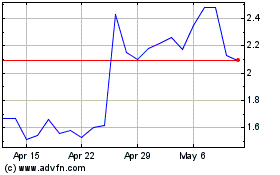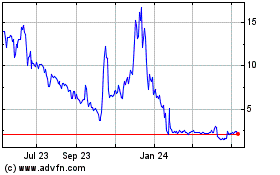Processa Pharmaceuticals Announces FDA Clearance of IND Application for a Phase 2 Clinical Trial of NGC-Cap in Breast Cancer
July 30 2024 - 8:00AM

Processa Pharmaceuticals, Inc. (Nasdaq: PCSA) (Processa or the
Company), a clinical-stage pharmaceutical company focused on
developing the next generation of chemotherapeutic drugs with
improved efficacy and safety, today announced that the U.S. Food
and Drug Administration (FDA) has cleared the Company’s
Investigational New Drug (IND) application for Next Generation
Capecitabine (NGC-Cap), its lead product candidate. The IND
supports the initiation of a Phase 2 clinical trial in patients
with advanced or metastatic breast cancer, which is expected to
begin enrollment this quarter.
“We are proud to achieve this significant
milestone for NGC-Cap and look forward to entering the clinic for
the treatment of advanced or metastatic breast cancer, where
capecitabine is a standard of care. We previously demonstrated in
our Phase 1b study that NGC-Cap is more potent than monotherapy
capecitabine, providing up to 5-10 times more 5-fluorouracil
exposure to cancer cells. This greater exposure resulted in a
greater efficacy, with a safety profile better or similar to
existing monotherapy with capecitabine,” stated David Young,
PharmD, Ph.D., President of Research and Development. “Initial data
from the Phase 2 trial are expected mid-2025.”
“Although capecitabine is among the most widely
used chemotherapy drugs, particularly for the treatment of solid
tumors, there remains the need for a more effective chemotherapy
treatment with fewer or less-severe side effects,” he added. “We
believe that NGC-Cap can fulfill this need.”
Breast cancer is the second most common cancer
and a leading cause of cancer-related death. More than 2 million
cases of breast cancer were diagnosed in 2022 with more than
665,000 deaths globally. The five-year survival rate for those
diagnosed with metastatic disease is approximately 30%.
The Phase 2 study will be a global multicenter,
open-label, adaptive design trial comparing two different doses of
NGC-Cap to FDA-approved monotherapy capecitabine in approximately
60 to 90 patients with advanced or metastatic breast cancer. The
trial is designed to evaluate the safety-efficacy profile of
NGC-Cap versus monotherapy capecitabine, to determine the potential
optimal dosage regimens of NGC-Cap as required by the FDA Project
Optimus Initiative and to evaluate the possibility of personalizing
NGC-Cap therapy. Processa expects to enroll the first patient into
this trial in the third quarter of 2024.
About Capecitabine Administered
with PCS6422 (NGC-Cap)
NGC-Cap combines the administration of PCS6422,
the Company’s irreversible dihydropyrimidine dehydrogenase (DPD)
enzyme inhibitor, with low doses of capecitabine. Capecitabine is
the oral prodrug of 5-FU, and along with 5-FU is among the most
widely used chemotherapy drugs, particularly for the treatment of
solid tumors. When metabolized (after oral ingestion) it becomes
5-FU in the body, which, in turn, metabolizes to molecules called
anabolites that actively kill duplicating cells, such as cancer
cells, and to molecules called catabolites that only cause side
effects. The presence of the DPD enzyme plays an integral role in
the undesirable conversion of 5-FU to catabolites while
simultaneously decreasing tumor exposure to 5-FU and it’s
anabolites.
The NGC-Cap Phase 1b study evaluated ascending
doses of capecitabine when combined with a fixed dose of PCS6422 in
patients with advanced, relapsed or refractory progressive
gastrointestinal tract cancer. These patients had to relapse from
or fail all other treatments. NGC-Cap demonstrated greater
5-fluorouracil (5-FU) exposure and lower fluoro-beta-alanine (FBAL)
exposure with a better or similar side effect profile compared with
monotherapy capecitabine, as well as preliminary anti-tumor
activity. In all evaluable patients who received one dose of
PCS6422 and seven days of capecitabine, partial responses or stable
disease was observed in 66.7% (8 out of 12) of patients with
progression-free survival of approximately 5 to 11 months across
these patients.
About Processa Pharmaceuticals, Inc.
Processa is a clinical-stage pharmaceutical
company focused on developing the Next Generation Chemotherapy
(NGC) drugs with improved safety and efficacy. Processa’s NGC drugs
are modifications of existing FDA-approved oncology therapies
resulting in an alteration of the metabolism and/or distribution of
these drugs while maintaining the existing mechanisms of killing
the cancer cells. By combining its novel oncology pipeline with
proven cancer-killing active molecules and its Regulatory Science
Approach, Processa’s strategy is to develop more effective therapy
options with improved tolerability for cancer patients through an
efficient regulatory path.
For more information, visit our website
at www.processapharma.com.
Forward-Looking Statements
This release contains forward-looking
statements. The statements in this press release that are not
purely historical are forward-looking statements which involve
risks and uncertainties. Actual future performance outcomes and
results may differ materially from those expressed in
forward-looking statements. Please refer to the documents filed by
Processa Pharmaceuticals with the SEC, specifically the most recent
reports on Forms 10-K and 10-Q, which identify important risk
factors which could cause actual results to differ from those
contained in the forward-looking statements.
Company Contact:Patrick
Lin(925) 683-3218plin@processapharma.com
Investor Relations
Contact:Yvonne BriggsLHA Investor Relations(310)
691-7100ybriggs@lhai.com
# # #
Processa Pharmaceuticals (NASDAQ:PCSA)
Historical Stock Chart
From Dec 2024 to Jan 2025

Processa Pharmaceuticals (NASDAQ:PCSA)
Historical Stock Chart
From Jan 2024 to Jan 2025
